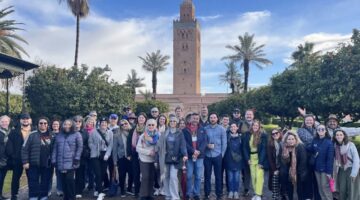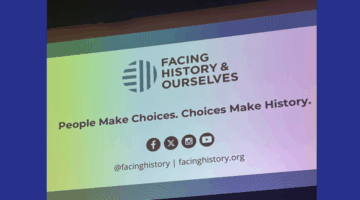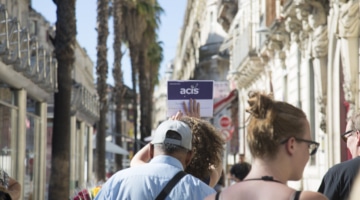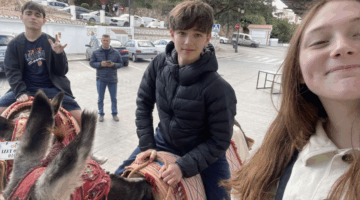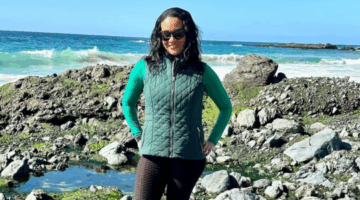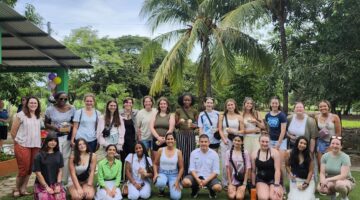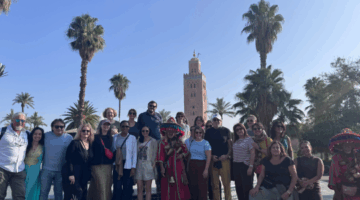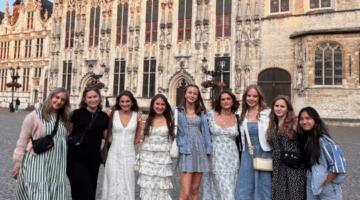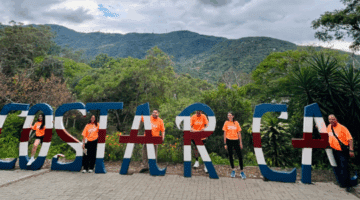As The World Turns with Peter Jones – Episode 2: ACIS Tour Manager Oihana Lazpita [VIDEO]
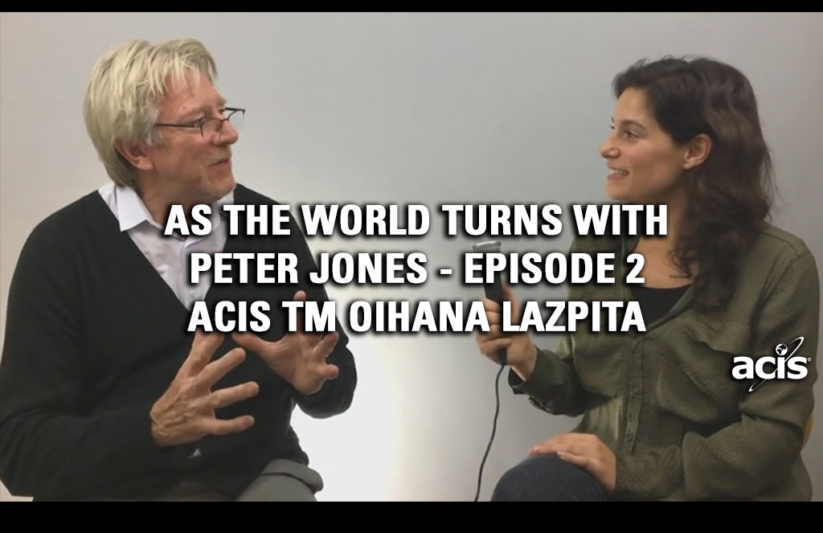
In December of 2016, before our annual meeting of the ACIS Tour Managers, we recorded a series of interviews with a handful of tour managers in our London office. The first of those interviews we’re publishing today is with Oihana Lazpita.
Oihana speaks five languages (Spanish, French, English, Portuguese and Basque). She guides ACIS groups across Spain, and she lives in Bilbao. She chatted with ACIS President Peter Jones about her experience growing up in the Basque country and how traveling as a student allowed her to develop a passion for learning languages.
Transcript of the interview is available below.
FREE LESSON PLAN
Online Tour of the Alhambra Lesson Plan
6 Spanish Classroom Lesson Plans to do with Your Students Based
on the New Bloom’s Taxonomy For World Language Instruction.
Peter: OK, so, I am with–I’m honored to be with somebody from Spain who works for us. Oihana Lazpita.
Oihana: There you go.
Peter: Gosh.
Oihana: It’s not easy.
Peter: And so, Oihana, tell us a little bit about where you’re from. And we’ll take it from there.
Oihana: OK, well, I’m from the north of Spain. I come from a region called the Basque country. So, it’s a very green area. It rains a little bit. Not as much as in the UK, but it–well, it’s a great area. So, that’s where I was born and raised. And then I started doing all my traveling. But that was my–that’s my root.
Peter: So, wait, though, you speak Basque?
Oihana: I do.
Peter: Wow.
Oihana: I do, yeah. But it’s not my first language. My mom was a Spanish speaker. So, that’s my mother tongue.
Peter: But in school, are you taught–
Peter: Is there kind of an allocation for Basque?
Oihana: Yeah, actually, there’s Basque schools where we learn Basque and Spanish, both languages are co-official. That’s one of the things that a lot of people don’t know about Spain–Is that we have, well besides Spanish, we have these other co-official languages that I’m sure you know about. But yeah, and Basque is one of them. So, it’s very completely different language to anything that you’ve heard before.
Peter: Right. It’s, well, Oihana is a Basque name, right?
Oihana: Yeah, exactly.
Peter: Yeah.
Peter: So, that’s already something that’s a tongue twister for us to say.
Oihana: I know. Yeah, I always tease my parents telling them, why didn’t you call me Maria or Laura something easy to remember.
Peter: How do you shorten that name? What do people that know you well– do they shorten it, or no?
Oihana: Well, you know, we do the Oihanita thing.
Peter: Oihanita.
Oihana: Which is to– yeah, or Oihi, Oihi.
Peter: Oihi.
Oihana: But that’s why I have–my name is Oihana–and most people call me Oihana.
Peter: So, obviously, we’re not speaking in Basque now. And nor Spanish. So, we’re in English. So, how did you learn your English?
Oihana: I studied in an English school not far from Vitoria, which is the city I was born at. And yeah, well, my brothers and sister used to go to this school, and it was a Montessori school. And well, that’s how I started learning English. And also because my parents, they were really, really
good travelers. They loved traveling. And they encouraged that into me. And by sending me every single summer to do a home stay in–
Peter: In England?
Oihana: In England at the beginning. In Canada when I was–
Peter: Whoa.
Oihana: They sent me to England when I was 11 and 12 to spend a month there.
Peter: Where in England did you go?
Oihana: I went to Worthing.
Peter: Worthing.
Oihana: Worthing, in the–
Peter: Yeah, in Sussex, right?
Oihana: Yeah, Sussex.
Peter: There you go.
Oihana: Both years. Then I went to a small village near Toronto for a month–when I was 13. And then, from then onwards, to France. So every single year, they would send me to–
Peter: So, you obviously speak French as well, right?
Oihana: I do. I lived just one hour from the border.
Peter: Right.
Oihana: I live in Bilbao now, which is an hour and 15 minutes–from the border with France.
Peter: Not bad at all. So, you’re sort of trilingual, basically.
Oihana: Yeah. And I do speak Basque, which is another one.
Peter: Well, wait there, so, I speak Basque. How do you say that in–
Oihana: [SPEAKING BASQUE]
Peter: God damn it, now what’s that all about? I’m sorry, can you go one more time with that?
Oihana: [SPEAKING BASQUE]
Peter: Wow.
Oihana: So, to give you an idea–
Peter: Yeah.
Oihana: If you want to say gracias, thank you–
Peter: Gracias.
Oihana: You have to say eskerrik asko.
Peter: Eskerrik asko.
Oihana: Eskerrik asko.
Peter: Eskerrik asko.
Oihana: You want to say hola, it’s kaixo, with a k and an x, which is completely–
Peter: Kaixo.
Oihana: It’s completely different.
Peter: So, hola is kaixo. Eskerrik asko is gracias.
Oihana: Yeah, agur, that’s bye bye.
Peter: Agur.
Oihana: Agur.
Peter: Wow.
Oihana: So, it’s very different. And yeah. And now, I’m studying Portuguese. That’s my new–I know, I have a passion for languages.
Peter: So, Portuguese. And Italian?
Peter: Do you–
Oihana: Italian I started–
Peter: Yeah?
Oihana:–years back. But then I started studying Portuguese. And I thought that it was too many languages.

